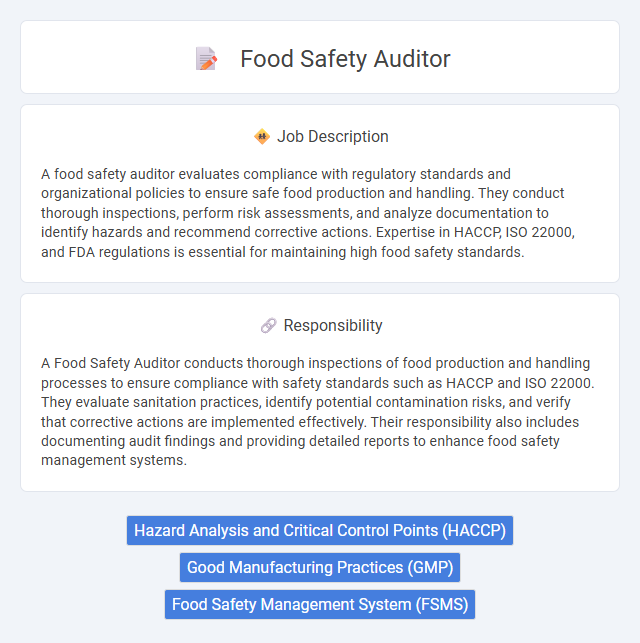
A food safety auditor evaluates compliance with regulatory standards and organizational policies to ensure safe food production and handling. They conduct thorough inspections, perform risk assessments, and analyze documentation to identify hazards and recommend corrective actions. Expertise in HACCP, ISO 22000, and FDA regulations is essential for maintaining high food safety standards.
Candidates with strong attention to detail and a commitment to upholding strict hygiene standards are likely suitable for a food safety auditor role. Individuals comfortable with conducting inspections and analyzing compliance documents may find this job aligns with their skills and personality. Those who prefer dynamic, field-based work environments and can handle the responsibility of identifying potential hazards in food production might fit well in this position.
Qualification
A Food Safety Auditor must possess a thorough understanding of HACCP principles, ISO 22000 standards, and regulatory compliance related to food production and handling. Certification from recognized bodies such as the International Register of Certificated Auditors (IRCA) or the Food Safety System Certification (FSSC) enhances credibility and career prospects. Strong analytical skills, attention to detail, and experience in conducting both internal and external audits within food manufacturing or processing environments are essential qualifications.
Responsibility
A Food Safety Auditor conducts thorough inspections of food production and handling processes to ensure compliance with safety standards such as HACCP and ISO 22000. They evaluate sanitation practices, identify potential contamination risks, and verify that corrective actions are implemented effectively. Their responsibility also includes documenting audit findings and providing detailed reports to enhance food safety management systems.
Benefit
A Food Safety Auditor position likely offers substantial benefits such as enhancing industry knowledge and improving attention to detail regarding safety protocols. This role probably increases employability in the food and beverage sector due to its critical focus on regulatory compliance and quality assurance. Professionals in this job may also experience job stability and opportunities for career growth as food safety remains a top priority globally.
Challenge
A food safety auditor likely faces the challenge of staying updated with constantly evolving regulations and industry standards, ensuring compliance across diverse food production environments. Managing the balance between thorough inspections and maintaining efficient operational flow may pose ongoing difficulties. The probability of encountering discrepancies or resistance from staff during audits could further complicate the role.
Career Advancement
A Food Safety Auditor plays a crucial role in ensuring compliance with regulatory standards such as ISO 22000 and HACCP by conducting thorough inspections and risk assessments within food production environments. Career advancement opportunities include progressing to roles like Quality Assurance Manager, Compliance Director, or Food Safety Consultant, which offer increased responsibility and leadership in developing food safety protocols. Continuous professional development through certifications such as Certified Professional Food Safety (CP-FS) enhances expertise and opens pathways to senior management positions in the food industry.
Key Terms
Hazard Analysis and Critical Control Points (HACCP)
Food safety auditors specializing in Hazard Analysis and Critical Control Points (HACCP) evaluate manufacturing processes to ensure compliance with established safety protocols. They systematically identify potential hazards, assess critical control points, and verify corrective actions to prevent contamination or foodborne illnesses. Proficiency in HACCP principles and regulatory standards is essential for maintaining product safety and quality assurance.
Good Manufacturing Practices (GMP)
Food safety auditors specializing in Good Manufacturing Practices (GMP) conduct thorough evaluations to ensure food production facilities adhere to established hygiene and safety standards. They assess compliance with GMP protocols related to sanitation, equipment maintenance, employee hygiene, and documentation to minimize contamination risks. Their expertise helps organizations maintain regulatory compliance, improve product quality, and protect consumer health.
Food Safety Management System (FSMS)
Food safety auditors play a critical role in evaluating and verifying the effectiveness of Food Safety Management Systems (FSMS) within food production and processing facilities. They conduct systematic inspections, review documentation, and assess compliance with standards such as ISO 22000 and HACCP to ensure that food safety hazards are identified, controlled, and minimized. Their audits help organizations maintain certification, improve risk management, and uphold consumer safety by ensuring adherence to regulatory and industry requirements.
 kuljobs.com
kuljobs.com